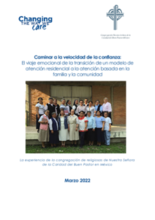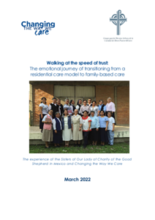This page contains documents and other resources related to children's care in the Americas. Browse resources by region, country, or category.
Displaying 331 - 340 of 3191
This webinar was hosted by the Transitioning Residential Care Working Group of the Transforming Children’s Care Global Collaborative Platform and showcased learning around the transition of residential care services.
A family from India froze to death just yards away from crossing into the United States from Canada. Desperate migrants are trying their luck on the northern border.
Este informe documenta las primeras etapas de un proceso de aprendizaje entre Cambiando la forma en que Cuidamos y la Congregación de las Hermanas de Nuestra Señora de la Caridad del Buen Pastor en México a medida que ellas avanzan en su proceso de transición. Este documento está dirigido a los profesionales, las organizaciones y los actores católicos interesados en apoyar o participar en un proceso de transición con las organizaciones católicas y también proporciona información útil para aquellos que participan en la transición con actores no religiosos. Esto incluye un importante aprendizaje relacionado con la forma de acompañar a las religiosas en el proceso de transición, comprendiendo los matices relacionados con el tiempo, el contenido y el enfoque. Y lo más importante es que explora el componente emocional que conlleva el hecho de que las religiosas, adapten el enfoque de su carisma a medida que se transforman, pasando de proporcionar atención residencial a una atención basada en la familia y la comunidad.
This brief documents the first stages of a learning process between Changing the Way We CareSM and the Mexican Province of the Congregation of the Sisters of Our Lady of Charity of the Good Shepherd as the Sisters moved forward in their transition process. It is written for practitioners and organizations, including Catholic actors interested in supporting or engaging in a transition process with women religious and also provides useful information for those engaging in transition with non-faith actors.
A family from India froze to death just yards away from crossing into the United States from Canada. Desperate migrants are trying their luck on the northern border.
As many as 20% of all child deaths from Covid in the US have occurred during the Omicron surge of the pandemic. Children seem to be facing increasing risks from COVID-19 even as mask mandates drop across the country, and vaccination rates among children stall out at alarmingly low rates.
Children seem to be facing increasing risks as mask mandates are abandoned and vaccination rates stall.
Six people who were part of a failed 1950s social experiment have won compensation from Denmark's government and have received a face-to-face apology from the prime minister.
A Bronx couple used foster care to exploit vulnerable young women, prosecutors and a woman who had been placed in their home said.
Informed by a case review of 36 Guatemalan children supported to reintegrate into families, and interviews with social workers and psychologists engaged in the process, this article explores the role of the “community connectedness” wellbeing domain. The authors explore how community connectedness or lack thereof, can contribute to child and parent/caregiver wellbeing and successful reintegration—the different types of community connectedness and who/what was involved in establishing and fostering these connections.




